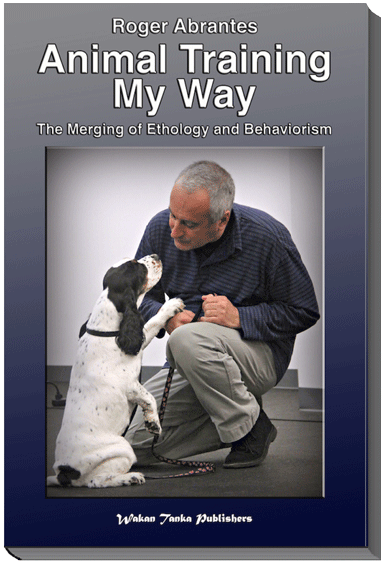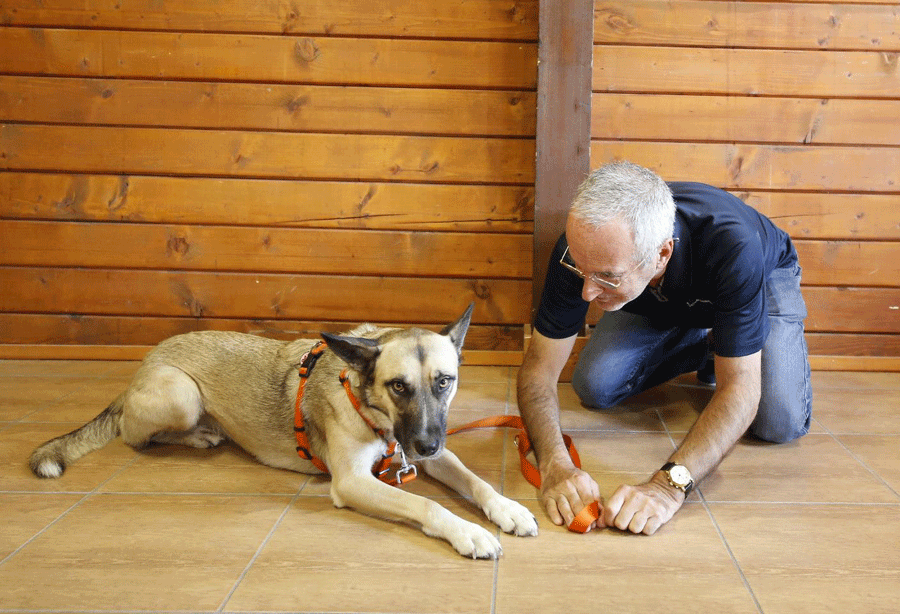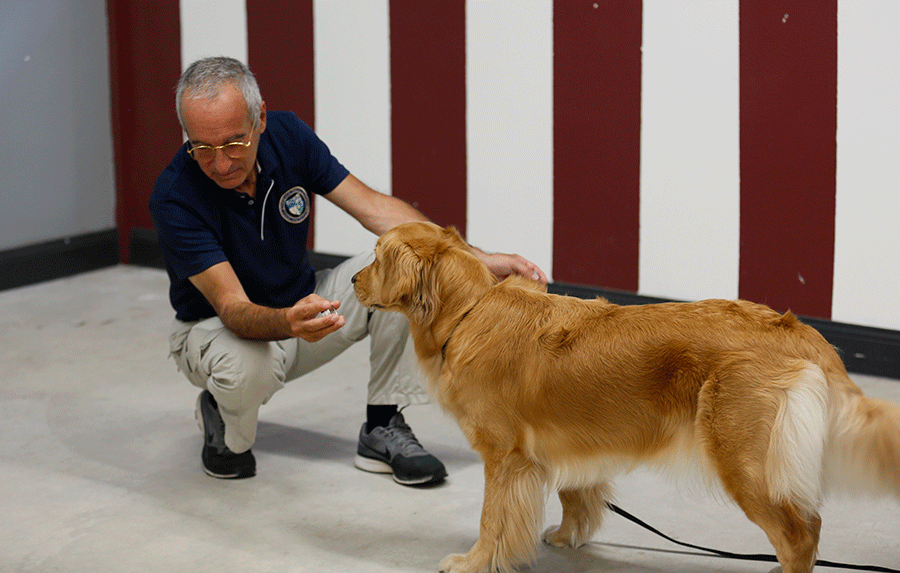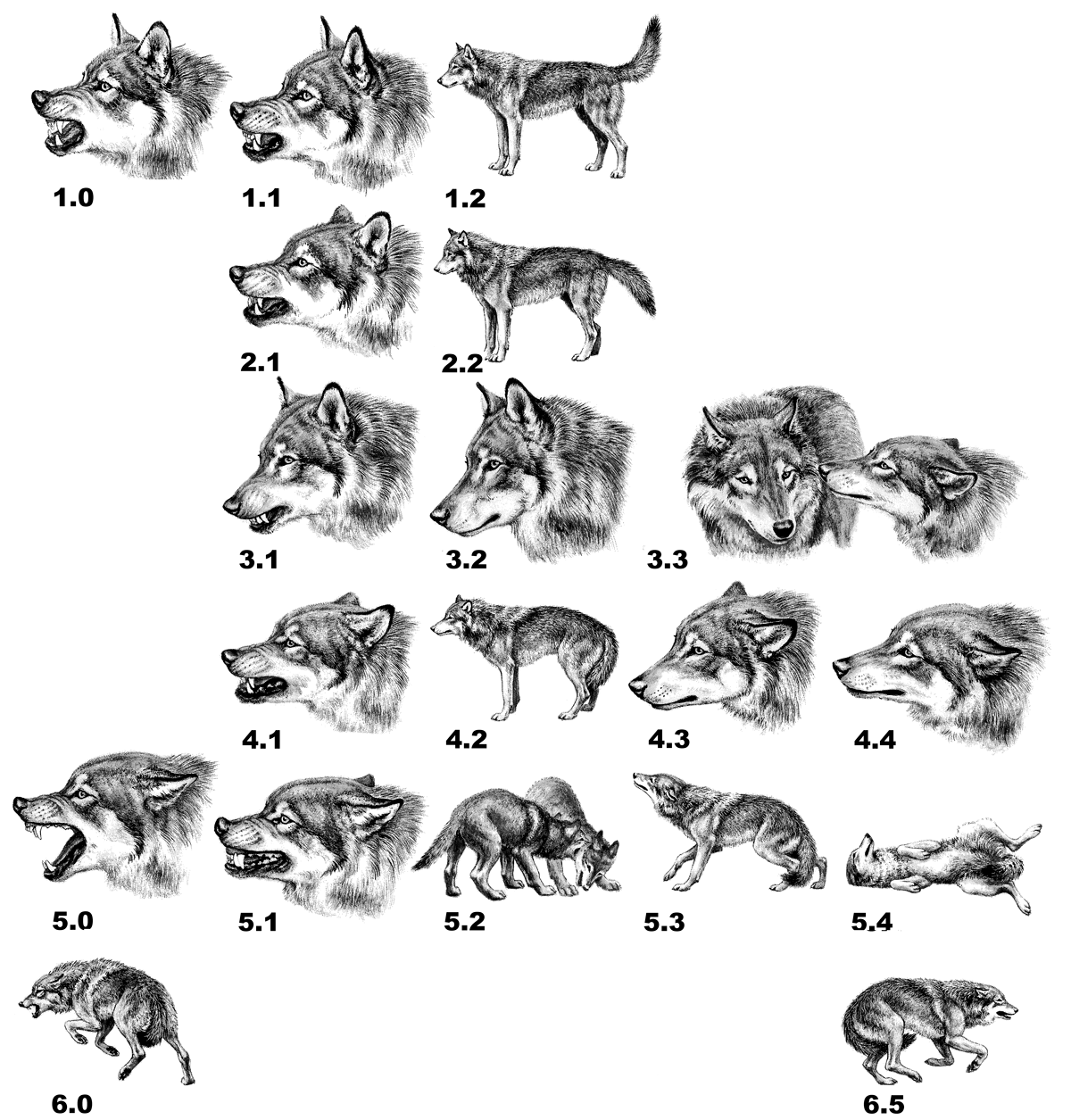


Animal Training My Way—Merging Ethology and Behaviorism
Workshop
Animal Training is a craft based on Animal Learning and Ethology dealing with the modification of the behavior of animals. This workshop (based on the book) is about making simple things simpler but not simpler than necessary. It’s about knowing what you want and what you need to get it. It’s about training animals, changing their behavior and creating harmonious relationships, but it’s foremost about training ourselves and changing our behavior.
Roger Abrantes reviews the most crucial elements when communicating and training animals, exemplifying them by working with live dogs. Abrantes merges behaviorism and ethology. He applies to each behavioristic principle his particular “ethology touch” in which it is the relationship between handler and animal that is the most significant motivator and reinforcer. Abrantes uses very few words (sounds) when training animals, which he shows live in this workshop. He communicates with the animals using very clear and exact body language, and calculated movements. In his words, “We do not need to control the animal or the environment, we only need to control ourselves—the results will then show.”
The event organizer selects 20 attendees to bring their dogs. Dr. Abrantes will work with these dogs and their owners. The dogs don’t need to be trained in any particular way or have any special skills; they only need to be well socialized.
Optionally, attendees can supplement their participation in this workshop by reading the book “Animal Training My Way” and by taking the course “The 20 Principles All Animal Trainers Must Know” online, and earn a certificate from the Ethology Institute. The book in this last course is also available in French, Portuguese, Spanish and Italian.
- Two-hour talk (conference version).
- Workshop, 2-day or 3-day for everybody.
- Online theory course “The 20 Principles All Animal Trainers Must Know“

Canine Scent Detection
Workshop
Localization of a target scent is one of the ultimate displays of the cooperation between two species, in this case, Homo sapiens sapiens and Canis lupus familiaris. It is the most refined result of their particular skills working together and toward a common, practical goal. This workshop is the working part of the course of the same name, which consists of two parts: (lessons 1 and 2) theory and practice.
Attendees can attend the workshop only, though we strongly recommend learning the theory before taking the practice. Attendees, who take the theory, Canine Scent Detection Course, and the practice receive a separate certificate.
Max. 30 attendees with 30 dogs working in teams of three. Each dog works 20 minutes and then rests while the team works with the other two dogs. Participants don’t need to bring their dogs as long as we have at least one dog per team, which is ten dogs in all. The dogs must be well socialized and have had some basic training in communication. “Sit,” “Come,” “Name,” “Yes,” and “No” or equivalent signals are necessary.
It is an exciting workshop and well-functioning teams will succeed in passing the double-blind test in scent detection after only three days (see movies).
See also Canine Scent Detection Course for more info including the manual and a movie.
- 3-day workshop.
- Link to online theory course and movie: Canine Scent Detection course (theory)

The Evolution of Canine Social Behavior —Dog Language
Seminar
Learn ethology from an ethologist! This is an entirely new and much-updated version of Professor Abrantes’ most popular talk and seminar—a comprehensive and exciting journey into the world of canine communication. The speaker illustrates all the aspects of canine communication with stunning slides and film clips (seminar only). He gives you precise definitions and thoroughly explanations of aggressive, fearful, dominant, and submissive behavior, greeting, bonding, friendliness, parental behavior, mating strategies, and more. Abrantes explains the many expressions shown by wolves, jackals, foxes, African wild dogs, dingos, coyotes, and domestic dogs. The talk and the seminar are also a comparative study of canine and human behavior based on the speaker’s books of the same title.
- 30-minute short symposium version
- 1-hour long symposium version
- 2-hour talk version – beginner/advanced
- 1-day seminar – beginner/advanced

Think Out of the Box—A Guide to an Open and Critical Mind
Talk
In this introduction to critical reasoning, Dr. Abrantes (who earned a BA in Philosophy before his Ph.D. in Evolutionary Biology) explains how we can combine being open-minded, critical and nonjudgmental, and reach rational conclusions. Sound and logical reasoning—you learn to analyze arguments rationally, to distinguish valid from invalid, and sound from unsound, to conduct rational discussions, to become a clearer and more persuasive debater. He gives many examples of common arguments and conclusions, how we can analyze them, improve them or refute them. Critical reasoning is the application of a set of procedures to decide the level of confidence one should have in a proposition based on the available evidence.
Dr. Abrantes writes in his book of the same title as this talk: “The truth is that we have many more options than we think (or our societies make us believe we have). To realize that, we have to begin thinking out of the box where we were put. ‘Thinking Out Of The Box’ is the first step you take on your journey to gain your freedom—and to be the one you want to be.”
This is a compulsory talk to everyone who wishes to make good and sound judgments.
- 1-hour conference version
- 3-hour lecture version

Morality after Darwin
Talk
This talk is a compelling and at times shocking analysis of our morality before and after Darwin. Undoubtedly, Darwin’s theory of evolution by means of natural selection changed the foundations of biology and the natural sciences forever. It did more than that; it also turned most of our beliefs suspicious, including religion and ethics. It raised questions that we cannot any longer discard as impertinent.
The impact of Darwinism is so vast that it is only now, more than 100 years after “The Origin of Species” that we begin to grasp its full repercussions. Philosopher and Evolutionary Biologist Roger Abrantes challenges and undermines, among others, the concepts of ‘human dignity’ and ‘the image of God’, which are central ideas of the foundations of Western morality. The consequences are unforeseen. Which moral code, if any, would be compatible with Darwinism? The implications of such a moral code, if possible, would be vast. That an animal is an intelligent, sentient being and feels pain is a bad criterion to justify we should treat it well. Does it imply, then, that we can treat badly those we believe are not intelligent, less sensitive or do not feel pain? Where do we draw the line?
- 1-hour conference version
- 2-hour lecture version
FAQ
Display none
display none
How many attendees can participate?
In a seminar or talk, you can have as many attendees as you want. In a workshop, where everyone is supposed to work with their animals, the maximum number is 30 (36 when Dr. Abrantes brings an assistant).
What kind of premises do I need to host an event?
It depends on how many attendees you expect. Workshops where we work with animals require more space per attendee.
What equipment do I need?
An HD projector (Mac compatible—most are), a sound system with handheld and lapel microphones, and a mini jack connection to a computer.
Can I sell products at the seminar/workshop?
Yes.
Can I, or the attendees, film the seminar/workshop?
No, thank you.
Will Ethology Institute promote my event?
Yes, we will assist you in promoting your event, and we will post it regularly on our social media pages and website, but the main responsibility is yours. Our experience shows that active promotion is the key to a fair number of attendees.
How do I pay for the event?
As the organizer, you’ll receive an invoice from us. The total fee and expenses are divided into three portions that you must pay no later than the dates stipulated. The first payment (deposit) is non-refundable. Attendees pay to you the fee that you determine.
Can I have a sponsor for my event?
Yes, you can, but Dr. Abrantes is under no obligation to your sponsor(s) or products. Dr. Abrantes accepts no personal sponsors in order to maintain his professional and academic integrity.
Can I cancel an event?
Yes, you can, but you must do it at least four weeks before the event should take place. In that case, you skip the payment of the second and third portion on the invoice. If you cancel less than four weeks from the event date, you will loose the deposit and the expenses incurred (like flight tickets) plus half of the seminar fee. Do not cancel an event before talking to Dr. Abrantes. If you are close to your break even point, we may decide to assist you.
What speaker-related expenses will I incur?
Speaker fee, travel costs, hotel accommodation, transport from/to airport and from/to event location, and meals during the seminar/workshop. You will receive a notification of travel expenses before committing to staging the event.
